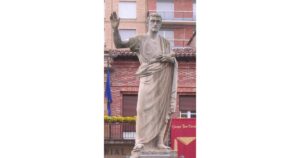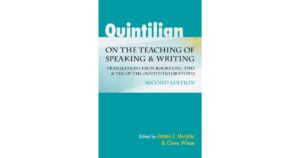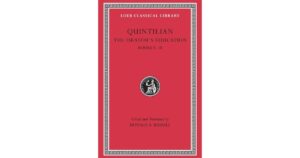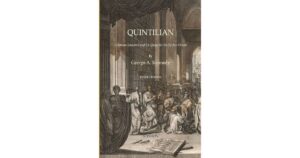Quintilian and His Famous Institutio Oratoria
Quintilian (35-100 CE) was a Roman rhetorician and literary critic who made significant contributions to the field of literary criticism. His most famous work, “Institutio Oratoria” (The Orator’s Education), is a comprehensive guide to rhetoric and literary criticism.
Table of Contents

Contributions to Literary Criticism:
- Emphasis on Context: He stressed the importance of understanding the historical and cultural context in which a literary work was written.
- Rhetorical Analysis: He developed a systematic approach to analyzing literary texts, focusing on the author’s use of rhetorical devices, structure, and style.
- Critique of Style: HE evaluated an author’s style, considering factors like clarity, elegance, and appropriateness to the subject matter.
- Importance of Imitation: He believed that imitation of classical models was essential for literary development, but also emphasized the need for originality.
- Role of the Critic: He saw the critic as a guide, helping readers understand and appreciate literary works.
- Pedagogical Approach: His work focused on teaching literary criticism and rhetoric, making it accessible to students.
- Influence on Western Literary Tradition: His ideas shaped Western literary criticism, influencing scholars like Erasmus, Montaigne, and Shaftesbury.
His contributions to literary criticism remain significant, as his ideas on context, rhetorical analysis, and style continue to inform literary studies today.

Quintilian’s most famous and influential work is:
- Institutio Oratoria (The Orator’s Education) – a comprehensive guide to rhetoric and literary criticism, consisting of 12 books.
Other notable works attributed to Quintilian:
- De Causis Corruptae Eloquentiae (On the Causes of Corrupted Eloquence) – a critique of contemporary rhetoric and literature.
- Declamationes (Declamations) – a collection of rhetorical exercises and model speeches.
- De Inventione (On Invention) – a work on the art of finding arguments and inventing ideas.
- De Rhetorica (On Rhetoric) – a brief overview of rhetorical principles.
However, the authenticity of these works is disputed among scholars, and some may be fragments or spurious attributions.
Institutio Oratoria remains Quintilian’s magnum opus and the primary source of his ideas on rhetoric, literary criticism, and education.
Quintilian’s views on poetry, drama, and language are outlined in his work “Institutio Oratoria”.

Quintilian on Poetry:
- Purpose: He sees poetry as a means of expressing emotions and ideas in a beautiful and ornate way.
- Imitation: He believes that poetry should imitate life, but also acknowledges the importance of artistic license.
- Style: He emphasizes the importance of style in poetry, advocating for clarity, elegance, and appropriateness to the subject matter.
- Figurative language: He discusses the use of figurative language, such as metaphor, simile, and allegory, to create vivid imagery and convey meaning.
Quintilian on Drama:
- Purpose: He views drama as a means of exploring human nature and emotions through action and dialogue.
- Plot: He emphasizes the importance of a well-structured plot, with a clear beginning, middle, and end.
- Characterization: He stresses the need for believable and well-developed characters.
- Language: He advocates for language that is natural, yet elevated, and suitable for the dramatic context.

Quintilian on the use of Language:
- Clarity: He emphasizes the importance of clear and concise language in both poetry and prose.
- Elegance: He advocates for language that is ornate and elegant, but not overly complex.
- Appropriateness: He stresses the need for language to be appropriate to the subject matter, audience, and context.
- Figurative language: He discusses the use of figurative language to create vivid imagery, convey meaning, and evoke emotions.
Overall, Quintilian’s views on poetry, drama, and language emphasize the importance of balance, appropriateness, and elegance, while also acknowledging the need for artistic license and creative expression.
Read and learn more: Horace and His Important Works| Ars Poetica







One thought on “Quintilian and His Famous Institutio Oratoria”